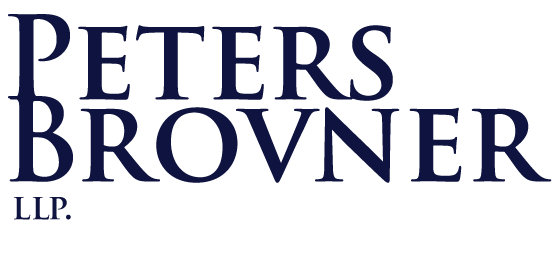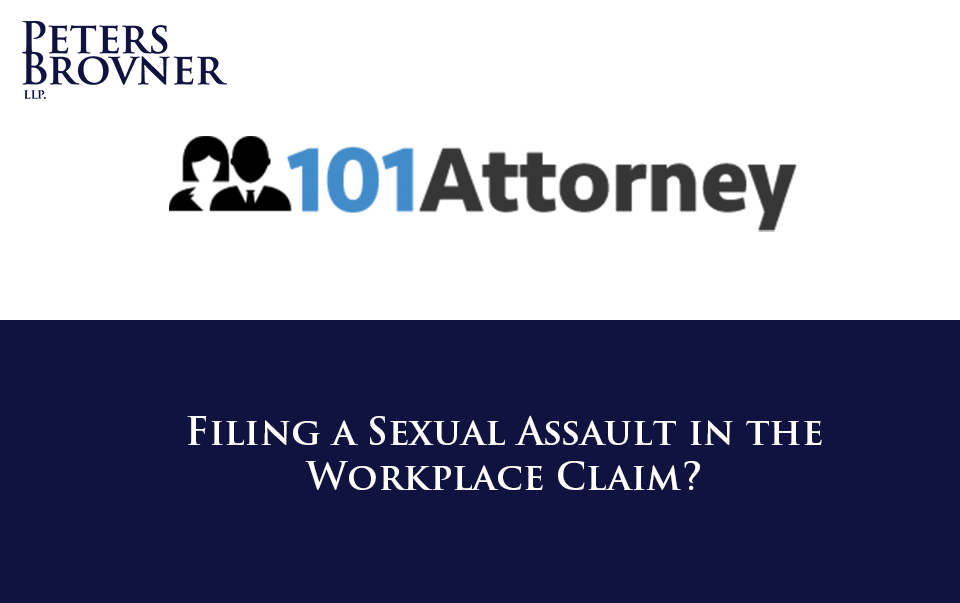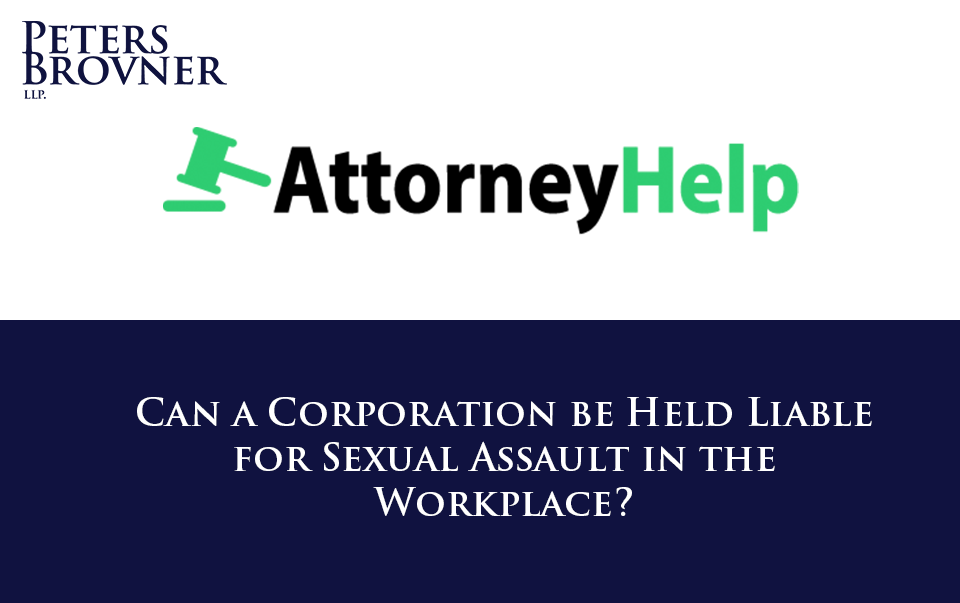NYC Sexual Harassment in The Workplace
Sexual harassment in the workplace is a form of employment discrimination that violates federal, State and local law in New York. Employers are required to take steps to prevent sexual harassment and, if sexual harassment is reported, to take immediate action to address the situation. An employee who reports sexual harassment is legally protected against retaliation from her, his or their employer.
Contact a NYC Sexual Harassment Attorney
The attorneys at the law offices of Peters Brovner LLP focus on holding City, State and private institutions accountable for actions that result in significant harm and personal injury, including failure to protect individuals from sexual misconduct.
If you or someone you know has been sexually harassed at a work and you need legal advice, please reach out to the lawyers at Peters Brovner LLP for a consultation.
ph: 917-639-3270
email: info@petersbrovner.com
Identifying Sexual Harassment
According to the federal Equal Employment Opportunity Commission (EEOC) federal law prohibits the following:
It is unlawful to harass a person (a job applicant or employee) because of that person’s sex.
- Harassment can include:
- Unwelcome sexual advances;
- Requests for sexual favors;
- Sexually offensive/inappropriate remarks or jokes;
- Unwanted touching or groping;
- Coerced sex acts;
- Requests for favors of a sexually suggestive nature;
- Displaying pornographic images, sexual graffiti, or offensive illustrations;
- Comments about a person’s gender or sexual preferences;
- Sexual gestures (e.g., pantomiming sex acts)., notes, teasing, jokes;
- Deliberate and unwelcome touching, pinching, patting;
- Attempts to kiss or fondle;
- Pressure for dates and/or pressure for sex;
- Sexually demeaning comments;
- Comments generally demeaning to one particular gender.
New York City’s laws provide even greater protection than federal law.
Harassment does not have to be of a sexual nature and can include offensive remarks about a person’s sex. For example, it is illegal to harass a woman by making offensive comments about women in general.
Both New York State and New York City Human Rights Laws explicitly prohibit sexual harassment based on, among other things, an individual’s sex, sexual orientation, and gender identity or expression.
While federal laws require that harassment be “severe or pervasive,” Both New York State and New York City have eliminated that requirement from their Human Rights Laws.
Quid Pro Quo Harassment
“Quid pro quo” literally means “this for that” in Latin. Quid pro quo sexual harassment occurs when someone in a position of authority (i.e.. a manager or supervisor) seeks sexual favors from a worker in return for some type of job benefit — such as a raise, better hours, promotion, etc. — or to avoid some type of detriment, like a pay cut, demotion, poor performance review, firing etc.
The elements of a federal Quid pro quo harassment claim are generally as follows:
- The victim is an employee (or job applicant) at the offending company.
- Some form of unwanted harassment occurs conditioned upon job opportunities (i.e. promises of promotion for giving into the harassment or threats of demotion etc. for refusing).
- The harasser has a position of power over the victim.
- The victim suffers some form of harm.
In some cases, it is possible to sue both the offending company as well as the specific harasser under the theory of respondeat superior.
Hostile Work Environment
A hostile work environment is one where a supervisor, manager or coworker, by words or actions negatively impacts another employee’s ability to work. Any employee can be responsible for creating such a hostile work environment.
According to the EEOC, an environment can become hostile under federal law when:
- There is unwelcome conduct, or harassment, based on race, sex, pregnancy, religion, national origin, age, disability or genetics
- The harassment continues and is long lasting
- The conduct is severe enough that the environment becomes intimidating, offensive or abusive
As noted above, the standards under New York City law are somewhat broader.
Offensive conduct may include, but is not limited to: offensive jokes, slurs, epithets or name calling, physical assaults or threats, intimidation, ridicule or mockery, insults or put-downs, offensive objects or pictures, and interference with work performance. Harassment can occur in a variety of circumstances, including, but not limited to, the following:
- The harasser can be the victim’s supervisor, a supervisor in another area, an agent of the employer, a co-worker, subordinate, or a non-employee.
- The victim does not have to be the person harassed but can be anyone affected by the offensive conduct.
- Unlawful harassment may occur without economic injury to, or discharge of, the victim
Sexual Harassment in The Virtual Workspace
That fact that victim and harasser are in separate places and do not meet face to face is not, of itself, a defense to a harassment claim. All of the conduct that constitutes sexual harassment if done in person will likely constitute harassment if done online as well.
Concerns About Retaliation
Both federal and local law prohibit retaliation against employees or job applicants who make good faith complaints about sexual harassment. Indeed, according to the EEOC retaliation is the most frequently alleged basis of discrimination in the federal sector and the most common discrimination finding in federal sector cases.
Federal law prohibits punishing job applicants or employees for asserting their rights against employment discrimination including harassment. Asserting these EEO rights is called “protected activity,” and it can take many forms. For example, it is unlawful to retaliate against applicants or employees for:
- Reporting harassment or being a witness in an EEO charge, complaint, investigation, or lawsuit
- communicating with a supervisor or manager about employment discrimination, including harassment
- answering questions during an employer investigation of alleged harassment
- refusing to follow orders that would result in discrimination
- resisting sexual advances, or intervening to protect others
It is important to note, however, that engaging in EEO activity, does not shield an employee from all discipline or discharge. Employers are free to discipline or terminate workers if motivated by non-retaliatory and non-discriminatory reasons that would otherwise result in such consequences.
Depending on the facts, it could be retaliation if an employer acts because of the employee’s EEO activity to:
- reprimand the employee or give a performance evaluation that is lower than it should be;
- transfer the employee to a less desirable position;
- engage in verbal or physical abuse;
- threaten to make, or actually make, reports to authorities (such as reporting immigration status or contacting the police);
- increase scrutiny;
- spread false rumors, treat a family member negatively (for example, cancel a contract with the person’s spouse); or make the person’s work more difficult (for example, punishing an employee for an EEO complaint by purposefully changing his or her work schedule to conflict with family responsibilities).
New York State and City Human Rights Laws similarly protect against retaliation. According to the New York City Commission on Human Rights, it is illegal for an employer to take action against an employee because the employee opposes or speaks out against sexual harassment in the workplace. Such retaliation can manifest through direct actions, such as demotions or terminations, or more subtle behavior, such an increased workload or being transferred to a less desirable location. The NYC Human Rights Law protects individuals against retaliation who have a good faith belief that their employer’s conduct is illegal, even if it turns out that they were mistaken.
When is my Employer Liable for Sexual Harassment?
Under Federal Law, an employer is liable for harassment by a supervisor that results in a negative employment action such as termination, failure to promote or hire, and loss of wages. If the supervisor’s harassment results in a hostile work environment (but no specific negative employment action), the employer can avoid liability only if it can prove that:
1) it reasonably tried to prevent and promptly correct the harassing behavior; and
2) the employee unreasonably failed to take advantage of any preventive or corrective opportunities provided by the employer.
Additionally, an employer will be liable for harassment by non-supervisory employees or non-employees over whom it has control (e.g., independent contractors or customers on the premises), if it knew, or should have known about the harassment and failed to take prompt and appropriate corrective action.
New York State and City statutes provide even greater protections. Most notably, they eliminate the requirement that the harassment be “severe and pervasive” thus making claims easier to prove.
In another important way, the New York City’s Human Rights Law goes further than Federal law in holding employers liable for sexual harassment. Under Title VII, employers may be vicariously liable for their employee’s discriminatory conduct, but such claims are subject to an affirmative defense that the employer has enacted sufficient policies and procedures to respond to complaints of discrimination. No such affirmative defense exists under the City HRL. Rather, an employer can be vicariously liable “based upon the [discriminatory] conduct of [its] employees or agents” under the City HRL “where:
(1) the employee or agent exercised managerial or supervisory responsibility; or
(2) the employer knew of the employee’s or agent’s discriminatory conduct, and acquiesced in such conduct or failed to take immediate and appropriate corrective action . . . ; or
(3) the employer should have known of the employee’s or agent’s discriminatory conduct and failed to exercise reasonable diligence to prevent such discriminatory conduct.
Blog Posts
and Media


